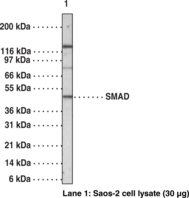| References |
| Formulation |
200 µl polyclonal antiserum |
| Stability |
6 months |
| Storage |
-20°C |
| Shipping |
Wet ice
in continental US; may vary elsewhere
|
| Specificity |
| Human SMAD1/5/8/9 |
(+) |
| Murine SMAD1/5/8/9 |
(+) |
| Rat SMAD1/5/8/9 |
(+) |
|
| Size |
Global Purchasing |
| 1 ea |
|
Description
Antigen:
two synthetic peptides corresponding to amino acids 19-33 and amino acids 315-329 of human SMAD1
·
Host:
rabbit
·
Application(s):
WB
·
Peptide sequence:
GWKQGDEEEKWAEKA and SNVNRNSTIENTRRH
·
SMADs are a family of intracellular proteins that are essential components in the signaling pathways of the serine/threonine kinase receptors of the transforming growth factor beta superfamily.1 SMADs can be divided into receptor-regulated SMADs (R-SMADs:SMAD1, SMAD2, SMAD3, SMAD5, SMAD8, and SMAD9), common-mediator SMAD (co-SMAD: SMAD4), and inhibitory SMADs (I-SMADs: SMAD6 and SMAD7). SMAD1, SMAD5, SMAD8, and SMAD9 have high degrees of homology and antibodies are available that recognize sequences common to all of them. SMAD8 and SMAD9 are typically used as alternate names for one another in the literature. This antibody is expected to detect SMAD 1, 5, 8, and 9.
1
Gemma, A., Hagiwara, K., Vincent, F., et al. hSmad5 gene, a human hSmad family member: Its full length cDNA, genomic structure, promoter region and mutation analysis in human tumors. Oncogene 16 951-6 (1998).
|






